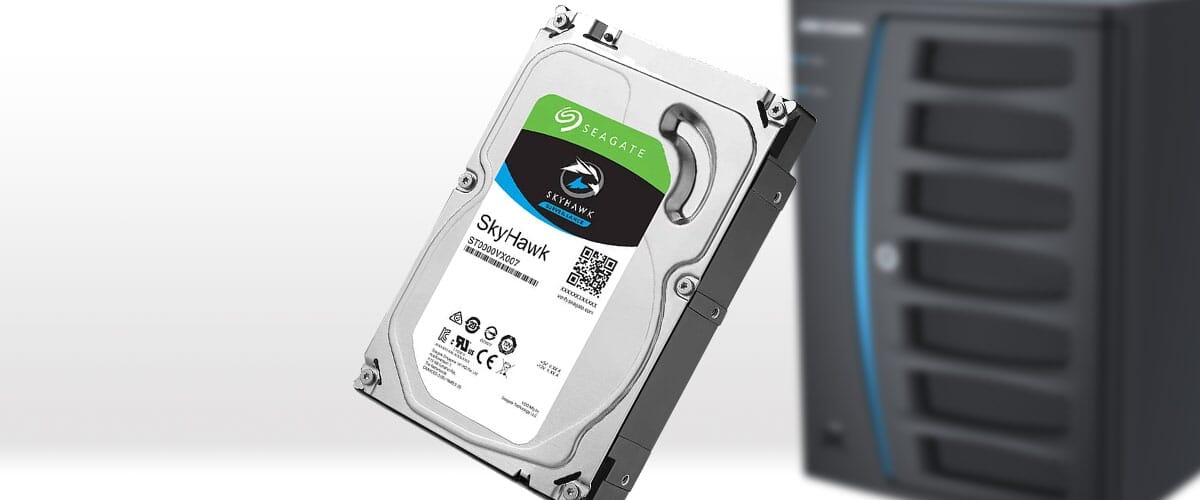How to extend the life of a hard drive in a CCTV recorder
Improve reliability and reduce cost by protecting your CCTV hard drive14/01/2018 Nathan Owen 32814

A typical mechanical hard drive will last on average 3 to 4 years however it is often the case with hard drives used in CCTV recorders for their life to be significantly shorter. Some users will even find themselves replacing hard drives in CCTV recorders every year.
When a hard drive fails in a CCTV recorder it can result in loss of important data and typically you won't realise until it's too late because you need to view footage from your system.
There are some simple measures you can take to extend the life of a hard drive in a CCTV recorder.
1. Use motion detection for recordings
Most CCTV recorders have the option to capture recordings continuously or when motion is detected in the scene.
Because a CCTV recorder is a 24/7 device using continuous recording means a hard drive has to work a lot harder and it will age must faster.
Another issue when using continuous recording on a CCTV recorder without a UPS is power failure. Continuous recording guarantees that if a power failure occurs the hard drive will be writing data. Cutting the power to a hard drive while it's writing data results in data loss and can cause drive corruption.
Using motion detection on a CCTV recorder is advisable because it reduces the work a hard drive has to do, extends the recording duration and makes searching the recordings much easier. Motion detection also means there is a good chance the drive won't be working in the event of a power loss.
2. Disable pre-record on your CCTV recorder
Many CCTV recorders have a feature call pre-record which is enabled by default. This is probably the most common cause of premature hard drive failures.
Pre-record works with motion detection to provide footage for a few seconds before motion was detected by your recorder. In order to do this the CCTV recorder will record continuously but only keep the recordings before, during and after motion was detected. This results in significantly higher hard drive use as data is constantly being written, deleted and moved on the disk. It also means that in the event of a power failure without the protection from a UPS the recorder will power off while the hard drive is in use which can result in data loss or drive failure.
To get the best out of your hard drive, disable pre-record and adjust the sensitivity of the motion detection to ensure recording starts as soon as the subject is identifiable in the image.
3. Select the right hard drive for CCTV use
As the use of CCTV recorders in homes and businesses has grown in popularity, hard drive manufacturers have started producing hard drives designed specifically for use in CCTV recorders.
Unlike standard PC hard drives which are used for infrequent use, CCTV specific hard drives are designed for constant use. The technology behind CCTV hard drives was adopted from hard drives that were originally designed for use in servers that also were subjected to similar workloads.
The CCTV specific hard drives would be less suited for use in a normal PC where data is written in a more random pattern. In a CCTV recorder, however, where data is written in a more consistent manner, they significantly improve the life of the drive.
Another type of hard drive that is gaining popularity are solid state drives (SSD). A solid-state drive has no moving parts and data is written to a memory chip rather than a spinning disk.
Originally SSDs were less suited to use in CCTV recorders as they had limited write cycles so their life was shortened very quickly when used continuously. There are now, however, new types of SSD that are designed for use in servers and other write intensive devices which makes them better suited to CCTV recorders. It is important when selecting an SSD for use in CCTV that it states it is for use in write intensive applications.
While SSDs are more expensive when compared to standard mechanical hard drives there are benefits that might make them appealing for use in CCTV
Benefits of using an SSD are
- Less heat generated because of no moving parts
- Not susceptible to damage from movement or vibration
- Lower energy consumption
- Smaller physical size and lighter
- Silent operation
- Very fast read times for smooth playback
When selecting a hard drive to use in your CCTV recorder there are several factors beyond just price to consider to ensure that you get the best value for money.
For advice on selecting a hard drive for use in a CCTV recorder you can speak to one of our CCTV experts who will be happy to advise you.
View our range of CCTV hard drives
4. Protect your CCTV equipment from power loss or surges
CCTV recorders are frequently writing data to their hard drives. If a power loss occurs while the recorder is writing data, the data may be lost, the drive could become corrupted or the drive could physically fail.
Often power losses occur for a very brief period, sometimes just enough to notice the lights flicker. Unfortunately, even brief power outages can cause damage to CCTV recorder hard drives.
Power surges can also be a problem and again can cause damage to CCTV recorders and hard drives.
To protect your CCTV recorders hard drive from power losses and surges you can install a UPS. A UPS or uninterruptible power supply is a simple plugin device that provides a battery backup to any mains powered electronic equipment in the event of a power failure.
If your cameras are powered from your recorder using POE or POC technology an added bonus is that your entire CCTV system can continue to operate in the event of a power loss.
Most UPS devices offer surge protection and battery backup for multiple devices. Just check that the maximum power available from the UPS is sufficient to power all the devices you want protected.
Shop for UPS battery backup devices
5. Control temperature and humidity
The life of a mechanical hard drive is significantly affected by the temperature and humidity in which it operates.
It is often common to install CCTV recorders in lofts, cupboards or other unventilated spaces. This practice may contribute to reducing the life of a hard drive in a recorder.
Try to ensure CCTV recorders are installed in a secure, well-ventilated space or enclosure that is protected from moisture and excessive heat.
6. Prevent vibration, shocks or movement
Mechanical hard drives with larger storage capacities are particularly susceptible to damage from movement, shock or vibration whilst they are in operation. This is because the components in larger hard drives are more tightly fitted into the enclosure and manufactured to extremely precise tolerances.
Smaller lower capacity hard drives such as laptop hard drives, whilst more expensive per megabyte, provide better protection from shock and vibration. This makes them a better choice for CCTV recorders that are likely to experience shock or vibration such as CCTV recorders on buses and trains.
SSD hard drives are almost immune to the effects of shock or vibration which again makes them a good choice for certain CCTV recorders.

About Nathan Owen